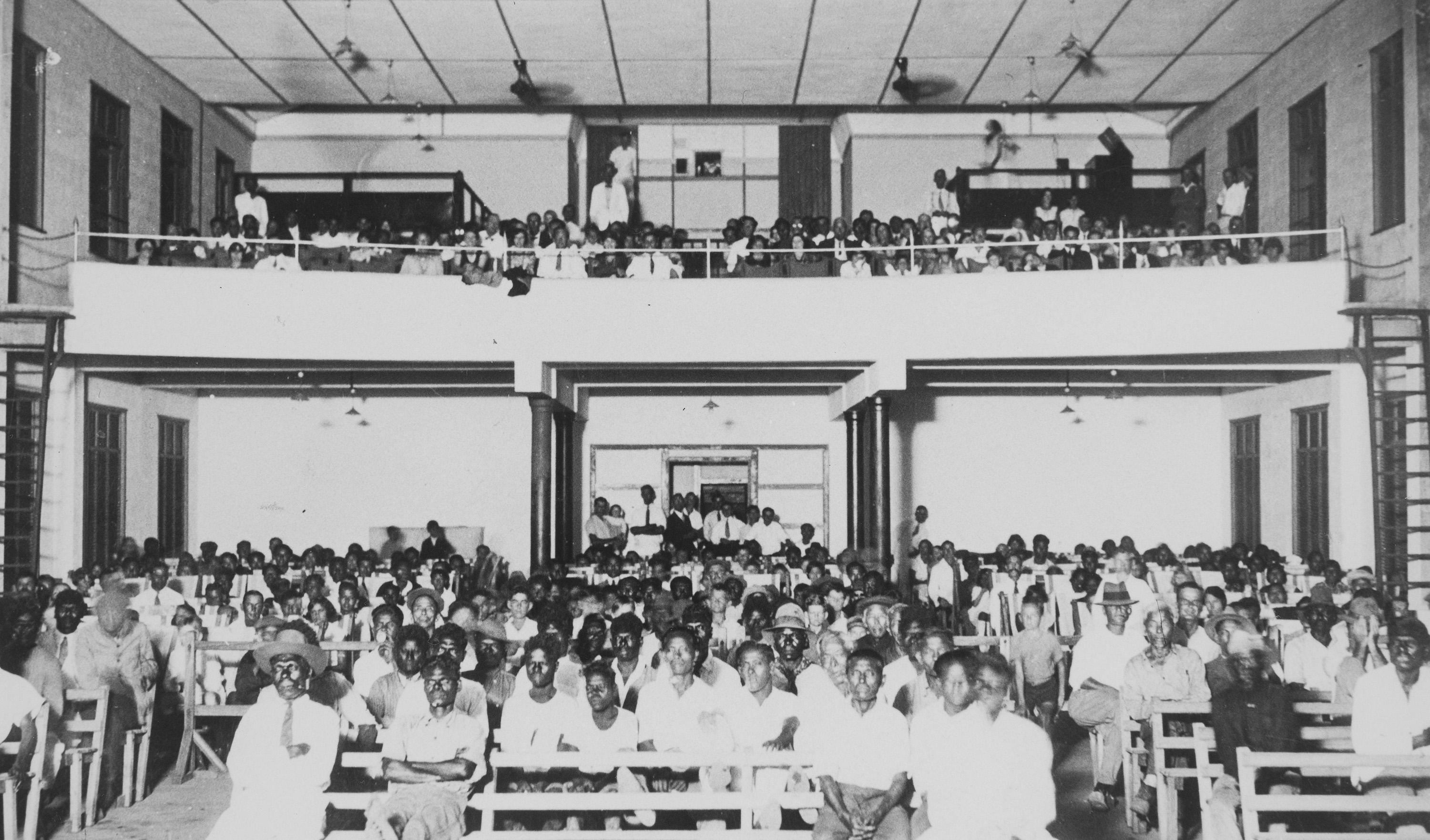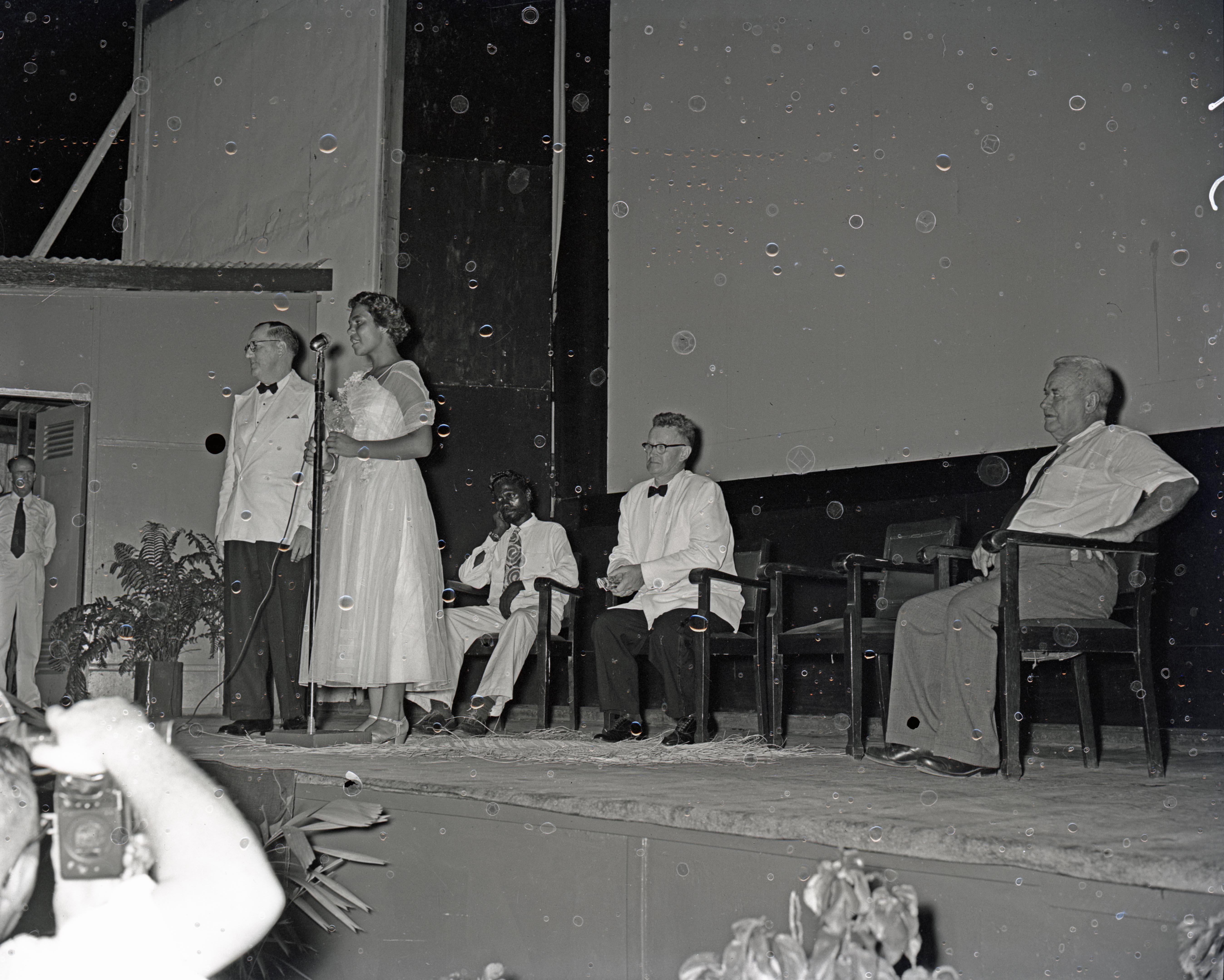Star Theatre (Darwin) on:
[Wikipedia]
[Google]
[Amazon]
 The Star Theatre was the first purpose-built cinema in Darwin in the
The Star Theatre was the first purpose-built cinema in Darwin in the
 The partially open air theatre was built by Snell and Gordon, the company of well-known Darwin builder Harold Snell, in the 1920s. The theatre's design was innovative at the time, in particular the roof structure, which Snell had studied in England. Only the rear rows at the back and upstairs dress circle was covered by a roof. The stage was on wheels to be moved for boxing matches and the floor was concrete in anticipation of future roller-skating events and social dances. It could seat 860 people.
The partially open air theatre was built by Snell and Gordon, the company of well-known Darwin builder Harold Snell, in the 1920s. The theatre's design was innovative at the time, in particular the roof structure, which Snell had studied in England. Only the rear rows at the back and upstairs dress circle was covered by a roof. The stage was on wheels to be moved for boxing matches and the floor was concrete in anticipation of future roller-skating events and social dances. It could seat 860 people.
 The business was leased to manager Tom Harris who later purchased the theatre. Harris was a popular figure in Darwin.
The balcony was reserved for Darwin high society while working class and Aboriginal people, who were given permission from the Chief Protector of Aborigines to break their night-time town curfew so they could attend, were expected to sit downstairs. It cost 2/6 pence to sit upstairs and only a shilling to "sit in the blacks".
The Australian film
The business was leased to manager Tom Harris who later purchased the theatre. Harris was a popular figure in Darwin.
The balcony was reserved for Darwin high society while working class and Aboriginal people, who were given permission from the Chief Protector of Aborigines to break their night-time town curfew so they could attend, were expected to sit downstairs. It cost 2/6 pence to sit upstairs and only a shilling to "sit in the blacks".
The Australian film
 The Star Theatre was the first purpose-built cinema in Darwin in the
The Star Theatre was the first purpose-built cinema in Darwin in the Northern Territory
The Northern Territory (commonly abbreviated as NT; formally the Northern Territory of Australia) is an states and territories of Australia, Australian territory in the central and central northern regions of Australia. The Northern Territory ...
of Australia
Australia, officially the Commonwealth of Australia, is a Sovereign state, sovereign country comprising the mainland of the Australia (continent), Australian continent, the island of Tasmania, and numerous List of islands of Australia, sma ...
. Destroyed during Cyclone Tracy
Cyclone Tracy was a tropical cyclone that devastated the city of Darwin, Northern Territory, Australia, from 24 to 26 December 1974. The small, developing easterly storm had been observed passing clear of the city initially, but then turned t ...
, it was the centre of Darwin's social life between the 1930s and 1960s.
Construction
 The partially open air theatre was built by Snell and Gordon, the company of well-known Darwin builder Harold Snell, in the 1920s. The theatre's design was innovative at the time, in particular the roof structure, which Snell had studied in England. Only the rear rows at the back and upstairs dress circle was covered by a roof. The stage was on wheels to be moved for boxing matches and the floor was concrete in anticipation of future roller-skating events and social dances. It could seat 860 people.
The partially open air theatre was built by Snell and Gordon, the company of well-known Darwin builder Harold Snell, in the 1920s. The theatre's design was innovative at the time, in particular the roof structure, which Snell had studied in England. Only the rear rows at the back and upstairs dress circle was covered by a roof. The stage was on wheels to be moved for boxing matches and the floor was concrete in anticipation of future roller-skating events and social dances. It could seat 860 people.
Centre of social life
The Star Theatre finally opened on 14 September 1929. The first film shown was ''The Cat and the Canary'' which had a film reel that was reported to be 10,000 feet long. The film was shown "without the slightest hitch except that Mr Allwright while attending to the engine got his hand caught in a rapidly moving belt and badly lacerated several fingers". The business was leased to manager Tom Harris who later purchased the theatre. Harris was a popular figure in Darwin.
The balcony was reserved for Darwin high society while working class and Aboriginal people, who were given permission from the Chief Protector of Aborigines to break their night-time town curfew so they could attend, were expected to sit downstairs. It cost 2/6 pence to sit upstairs and only a shilling to "sit in the blacks".
The Australian film
The business was leased to manager Tom Harris who later purchased the theatre. Harris was a popular figure in Darwin.
The balcony was reserved for Darwin high society while working class and Aboriginal people, who were given permission from the Chief Protector of Aborigines to break their night-time town curfew so they could attend, were expected to sit downstairs. It cost 2/6 pence to sit upstairs and only a shilling to "sit in the blacks".
The Australian film Jedda
''Jedda'', released in the UK as ''Jedda the Uncivilized'', is a 1955 Australian film written, produced and directed by Charles Chauvel. His last film, it is notable for being the first to star two Aboriginal actors, Robert Tudawali and Ngarl ...
had its world premiere at the Star Theatre on 3 January 1955. Harris arranged for a member of the Warhiti tribe "to sing songs and burn sticks to prevent any unwanted rainfalls during the screening. He decorated the theatre for the opening with pandanus, grass mats and Aboriginal artefacts. Large crowds gathered along Smith Street to catch a glimpse of the film's stars Ngarla Kunoth
Rosalie Lynette Kunoth-Monks (4 January 193726 January 2022), also known as Ngarla Kunoth, was an Australian film actress, Aboriginal activist and politician.
Early life
Rosalie Lynette Kunoth was born on 4 January 1937 in Utopia, Northern ...
and Robert Tudawali
Robert Tudawali (1929 – 26 July 1967), also known as Bobby Wilson and Bob Wilson, was an Australian actor and Indigenous activist. He is known for his leading role in the 1955 Australian film ''Jedda'', which made him the first Indigenous Aus ...
, better known as Bob Wilson, who were permitted to sit in the balcony with the Northern Territory Administrator Frank Wise
Frank Joseph Scott Wise AO (30 May 1897 – 29 June 1986) was a Labor Party politician who was the 16th Premier of Western Australia. He took office on 31 July 1945 in the closing stages of the Second World War, following the resignation of ...
and his wife. Tudawali decided to sit downstairs. It was reported that a number of Aborigines who were invited had paddled in from Bathurst Island to attend.
The Star lost popularity during the 1960s when two new cinemas opened in Darwin by Michael Paspalis, the open-air Parap Theatre and the drive-in cinema at Nightcliff
Nightcliff is a northern suburb of the city of Darwin, Northern Territory, Australia.
History
Although the origin of the name Nightcliff has always been surrounded by conjecture and controversy, the naming can be tracked back to 8 September ...
in 1964.
Current use
The Star Theatre was destroyed during Cyclone Tracy in 1974 and never reopened. Manager Tom Harris had died the year before after 40 years in the Northern Territory. His son, Tom Harris Junior, renovated the theatre, turning the projector room into a flat where he and his wife would live for a number of years. The Star was renovated again and turned into a small shopping village containing a number of small shops and cafes. It continues to be a shopping arcade, now known as Star Village. The original projector is still on display near the entrance to the arcade. An application to heritage list the theatre was made in 1995 but was unsuccessful due to opposition from the owners.References
{{coord, -12.46409, 130.84306, format=dms, type:landmark_region:AU-NT, display=title Buildings and structures in Darwin, Northern Territory Theatres in the Northern Territory Cinemas in the Northern Territory Former cinemas